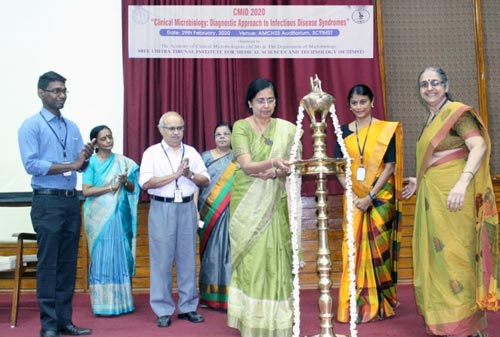Sree Chitra Tirunal Institute For Medical Sciences And Technology (SCTIMST) Thiruvananthapuram an autonomous institution of Department of Science & Technology (DST) hosted a Continuing Medical Education (CME) programme ‘Diagnostic Approach to Infectious Disease Syndromes’ on Clinical Microbiology to update knowledge of clinical microbiologists, general physicians, infectious disease physicians, pediatricians and technical staff engaged in infectious disease diagnostics.
The CME was inaugurated by Dr. Asha Kishore, Director SCTIMST and felicitated by the Dean, President of Academy of Clinical Microbiologists and HOD, Microbiology Department, Government Medical College, Trivandrum and Dr.Kavita Raja, Professor and Head, Department of Microbiology, Hospital Wing, SCTIMST, Trivandrum
This programme targets clinical microbiologists, general physicians, infectious disease physicians, pediatricians, and technical staff engaged in infectious disease diagnostics. It is being hosted by the Department of Microbiology, SCTIMST, under the aegis of the Academy of Clinical Microbiologists. The Academy of Clinical Microbiologists is an organization of doctors in Microbiology who lend their clinical acumen to the reports generated in the Microbiology lab, thus making it easier for the clinician to give a targeted treatment to the patient and improving patient care.
This CME aims to get together all the doctors and technical staff involved in the management of infections, getting renowned faculty to address the problems, and create a venue to present cases or studies done by the different levels of workers in this field. Six faculty addressed the delegates on various infectious diseases, and there were 22 oral presentations and 23 posters on display. These led to a lot of discussions for solutions in the future.
Recently the world has seen a rapid increase in the number of microorganisms that cause calamities of global scale like Ebola, Crimean Congo hemorrhagic Fever, Zika virus, SARS, and the latest being COVID-19. Kerala had its due share in the form of Nipah in 2018. This was clinically suspected by a clinician who sent it outside Kerala to a well-equipped lab in the private sector. This resulted in catching the epidemic before it could create a crisis in the state or country.
One reason for infections to spread quickly is a lack of understanding of how to diagnose the infection at the microorganism level. Lack of Microbiology labs at the periphery is one reason. Another reason is the lack of knowledge among both clinicians and laboratory personnel, about the available testing modalities and where exactly to send the samples.
The testing modalities for infectious diseases are getting more and more expensive. Hence one of the mandates now adopted by SCTIMST is the development of rapid testing devices for infectious diseases. The CME helped the delegates from the Institute to understand the needs and get an insight into the scope of infectious disease diagnostics.































